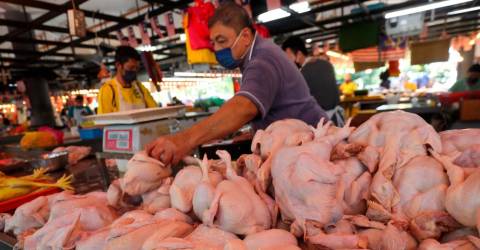PETALING JAYA: The entire supply chain will need to be overhauled to ensure that chicken and eggs are available to consumers at a reasonable price.
Otherwise, producers, wholesalers and retailers claim, they will be put out of business.
There are many problems to be resolved. For producers, the cost of feed has risen, forcing them to raise prices.
The price increase is passed on to wholesalers and eventually to retailers. However, both wholesalers and retailers are not allowed to sell above the ceiling price, making it unprofitable to continue with the business.
The increased production cost has also forced many producers to export their chicken and eggs as they can fetch higher prices, resulting in a shortage in Malaysia.
Poultry farmer Zainul Bukhairi said with the increase in the price of soy and maize, he now has to allocate more money to buy feed, leaving him with less for broilers.
A 50kg bag of feed now sells at RM121, up from RM111 last year.
For Zainul, that means he has fewer birds to sell for the same amount of money he spends on feed.
“In some months, I even incur losses. Times have been difficult since the third quarter of 2020,” he told theSun.
He added that the government could help by raising the subsidy on feed or broilers to enable farmers to increase production.
The price of chicken has risen from RM7.70 to RM8.90 per kilogramme since April last year.
Wholesalers and retailers face a different set of problems.
According to Malaysian Muslim Wholesalers and Retailers Association chairman Mohamed Suhubudeen Sahubar Ali, they have to foot the bill for transporting the chicken and eggs from the farms, thus raising costs.
“For instance, wholesalers are charged RM3.50 for a tray of eggs, which is 20 sen below the ceiling price of RM3.70,” he said.
“However, we also have to pay 10 sen for every tray of 10 eggs as transport cost.”
He pointed out that wholesalers would then have to raise their prices, making it almost impossible for retailers to sell the eggs at the recommended retail price.
Retailers are also bogged down by other expenses. For instance, a retailer needs up to eight licences to run a business, several of which are issued by the Domestic Trade and Consumer Affairs Ministry.
The owner of one of Malaysia’s biggest retail chains, Mydin Mohamed Holdings Bhd, has recommended that the government puts a stop to the export of chicken and eggs as the first step to addressing the problem of price increases.
Its managing director Datuk Ameer Ali Mydin said steps have to be taken to ensure that local demand is met first.
“If that had been done earlier, we would not be facing this problem today.”
“This is all happening because of the failure to manage the demand and supply within the country,” he added.
Ameer said red tape was another problem that needed to be dealt with, adding that there was a limit to how much chicken and eggs each wholesaler is allowed to import for every approved permit (AP).
“These are unnecessary requirements. Such items are perishable, so we are not going to import more than we can sell anyway.”
He said because of these additional requirements, there were many more questions to answer before an AP is issued.
Ameer added that the number of foreign suppliers approved by the Islamic Development Department of Malaysia (Jakim) is limited, making it impossible to import a larger quantity even if there was demand.
“We depend on only four suppliers from Australia, and this enables them to dictate prices and terms.”
He said Jakim could look at the list of suppliers that has been approved by the government of Saudi Arabia and include the same suppliers on its list.
“After all, Jakim (should) trust the halal certification given by the Saudi government, right?”


